This document provides an overview of the Specific Relief Act of 1963 in India. Some key points:
- The Act defines and amends laws related to specific types of relief. It extends to all of India except Jammu and Kashmir.
- The Act covers recovering possession of property, specific performance of contracts, and outlines which contracts can and cannot be specifically enforced.
- It establishes that specific relief can only be granted to enforce individual civil rights, not penal laws. Specific performance of contracts depends on factors like whether compensation is adequate and whether the court can supervise performance.
- The Act specifies who can obtain specific performance, such as parties to a contract or their representatives, and limits it in some
![THE SPECIFIC RELIEF ACT, 1963
ACT NO. 47 OF 1963
An Act to define and amend the law relating to certain kinds of
specific relief.
[13th December, 1963.]
BE it enacted by Parliament in the Fourteenth Year of the
Republic of India as follows:-
PART
PRELIMINARY
PART I
PRELIMINARY
1.
Short title, extent and commencement.
1. Short title, extent and commencement.- (1) This Act may be
called the Specific Relief Act, 1963.
(2) It extends to the whole of India except the State of Jammu
and Kashmir.
(3) It shall come into force on such date 1* as the Central
Government may, by notification in the Official Gazette, appoint.
2.
Definitions.
2. Definitions.- In this Act, unless the context otherwise
requires,-
(a) "obligation" includes every duty enforceable by law;
(b) "settlement" means an instrument (other than a will or
codicil as defined by the Indian Succession Act, 1925
(39 of 1925)) whereby the destination or devolution of
successive interests in movable or immovable property
is disposed of or is agreed to be disposed of;](https://image.slidesharecdn.com/specificreliefact1963-141209121004-conversion-gate02/85/Bare-Act-Specific-Relief-Act-1963-1-320.jpg)
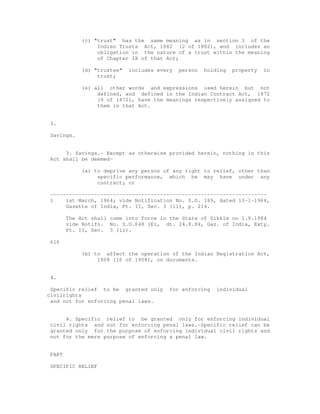
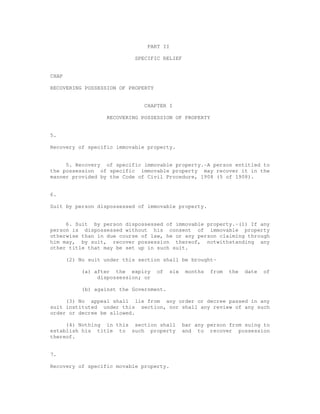
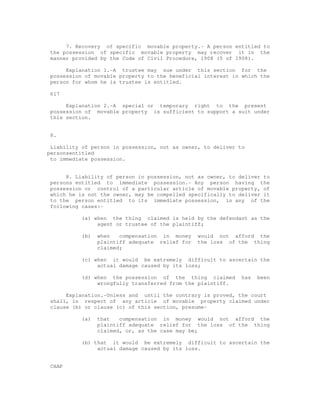
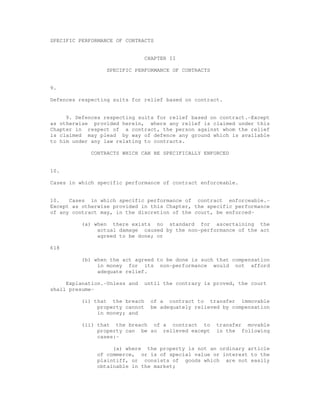
![(b) where the property is held by the defendant as
the agent or trustee of the plaintiff.
11.
Cases in which specific performance of contracts connected with
trustsenforceable.
11. Cases in which specific performance of contracts connected
with trusts enforceable.-(1) Except as otherwise provided in this Act,
specific performance of a contract may, in the discretion of the
court, be enforced when the act agreed to be done is in the
performance wholly or partly of a trust.
(2) A contract made by a trustee in excess of his powers or in
breach of trust cannot be specifically enforced.
12.
Specific performance of part of contract.
12. Specific performance of part of contract.- (1) Except as
otherwise hereinafter provided in this section, the court shall not
direct the specific performance of a part of a contract.
(2) Where a party to a contract is unable to perform the whole of
his part of it, but the part which must be left unperformed bears only
a small proportion to the whole in value and admits of compensation in
money, the court may, at the suit of either party, direct the specific
performance of so much of the contract as can be performed, and award
compensation in money for the deficiency.
(3) Where a party to a contract is unable to perform the whole of
his part of it, and the part which must be left unperformed either-
(a) forms a considerable part of the whole, though admiting
of compensation in money; or
(b) does not admit of compensation in money;
619
he is not entitled to obtain a decree for specific performance; but
the court may, at the suit of the other party, direct the party in
default to perform specifically so much of his part of the contract as
he can perform, if the other party-
(i) in a case falling under clause (a), pays or has paid the
agreed consideration for the whole of the contract
reduced by the consideration for the part which must be
left unperformed and in a case falling under clause
(b), 1*[pays or has paid] the consideration for the
whole of the contract without any abatement; and](https://image.slidesharecdn.com/specificreliefact1963-141209121004-conversion-gate02/85/Bare-Act-Specific-Relief-Act-1963-6-320.jpg)
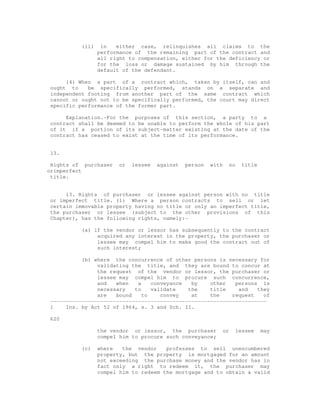
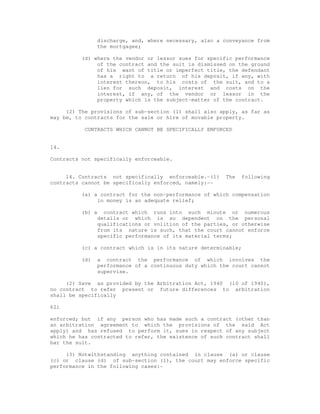
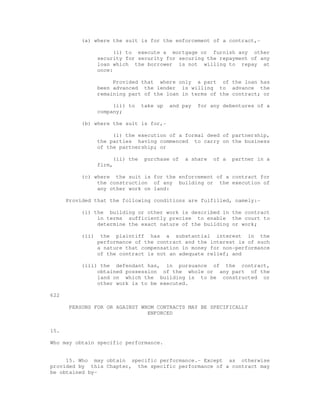
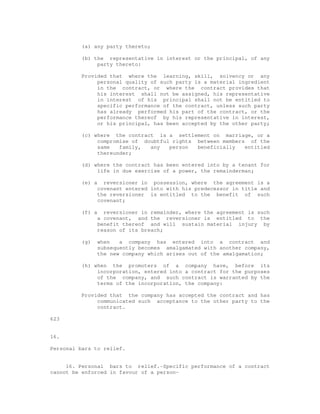
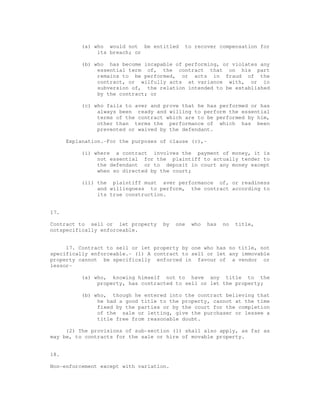
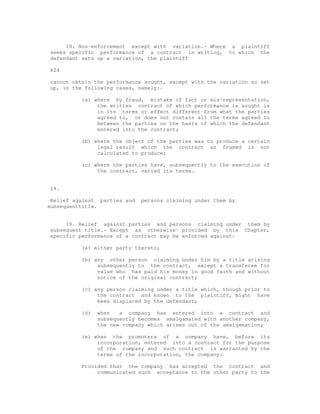
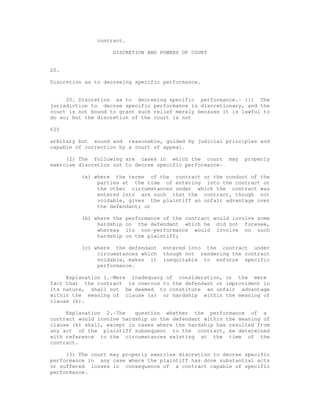
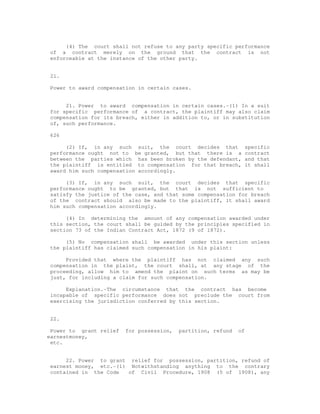
![person suing for the specific performance of a contract for the
transfer of immovable property may, in an appropriate case, ask for-
(a) possession, or partition and separate possession, of the
property, in addition to such performance; or
(b) any other relief to which he may be entitled, including
the refund of any earnest money or deposit paid or
1*[made by] him, in case his claim for specific
performance is refused.
(2) No relief under clause (a) or clause (b) of sub-section (1)
shall be granted by the court unless it has been specifically claimed:
Provided that where the plaintiff has not claimed any such relief
in the plaint, the court shall, at any stage of the proceeding, allow
---------------------------------------------------------------------
1 Subs. by Act 52 of 1964, s. 3 and Sch. II, for "made to".
627
him to amend the plaint on such terms as may be just for including a
claim for such relief.
(3) The power of the court to grant relief under clause (b) of
sub-section (1) shall be without prejudice to its powers to award
compensation under section 21.
23.
Liquidation of damages not a bar to specific performance.
23. Liquidation of damages not a bar to specific performance.-(1)
A contract, otherwise proper to be specifically enforced, may be so
enforced, though a sum be named in it as the amount to be paid in case
of its breach and the party in default is willing to pay the same, if
the court, having regard to the terms of the contract and other
attending circumstances, is satisfied that the sum was named only for
the purpose of securing performance of the contract and not for the
purpose of giving to the party in default an option of paying money in
lieu of specific performance.
(2) When enforcing specific performance under this section, the
court shall not also decree payment of the sum so named in the
contract.
24.
Bar of suit for compensation for breach after dismissal of suit
forspecific
performance.
24. Bar of suit for compensation for breach after dismissal of](https://image.slidesharecdn.com/specificreliefact1963-141209121004-conversion-gate02/85/Bare-Act-Specific-Relief-Act-1963-15-320.jpg)
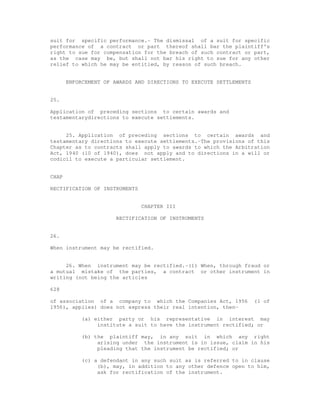
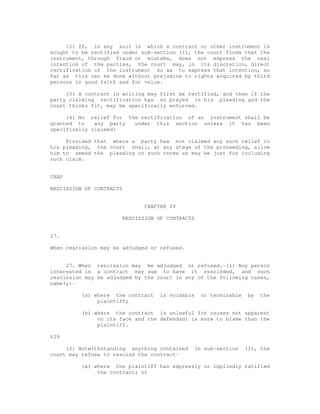
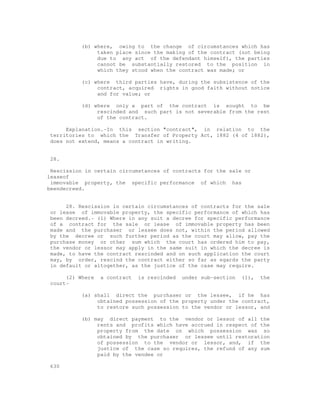
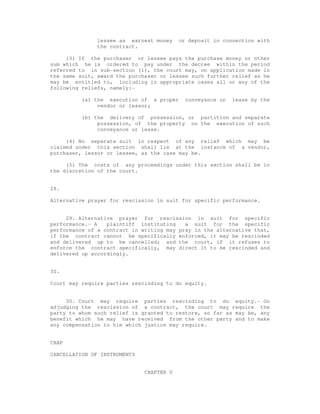
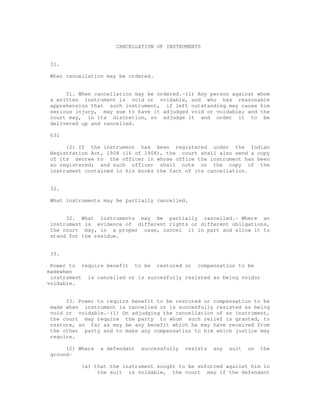
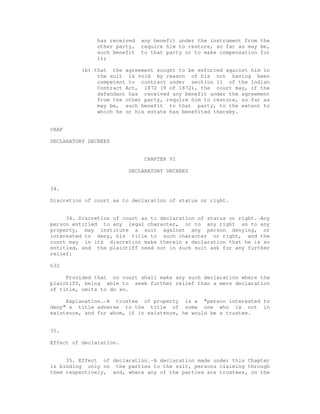
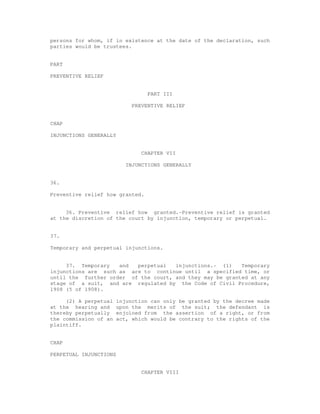
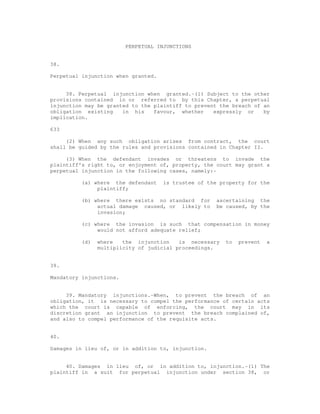
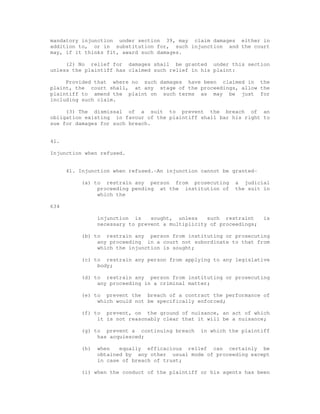
![such as to disentitle him to the assistance of the
court;
(j) when the plaintiff has no personal interest in the
matter.
42.
Injunction to perform negative agreement.
42. Injunction to perform negative agreement.- Notwithstanding
anything contained in clause (e) of section 41, where a contract
comprises an affirmative agreement to do a certain act, coupled with a
negative agreement, express or implied, not to do a certain act, the
circumstance that the court is unable to compel specific performance
of the affirmative agreement shall not preclude it from granting an
injunction to perform the negative agreement:
Provided that the plaintiff has not failed to perform the
contract so far as it is binding on him.
43.
[Repealed.]
43. [Amendment of Act 10 of 1940.] Rep. by Act 56 of 1974, s. 2
and Sch. I.
44.
[Repealed.]
44. [Repeal] Rep. by s. 2 and Sch. I, ibid.](https://image.slidesharecdn.com/specificreliefact1963-141209121004-conversion-gate02/85/Bare-Act-Specific-Relief-Act-1963-25-320.jpg)